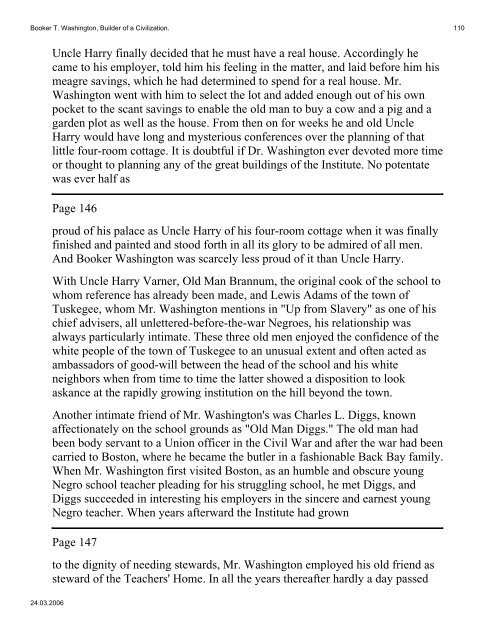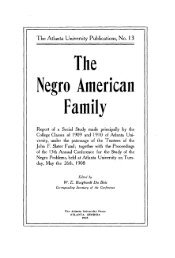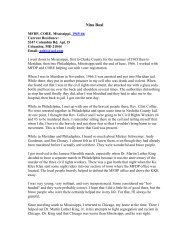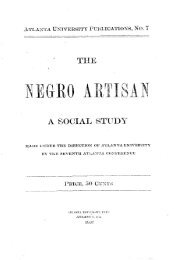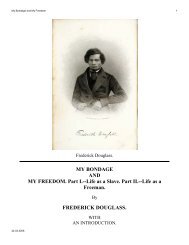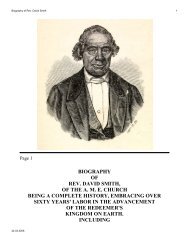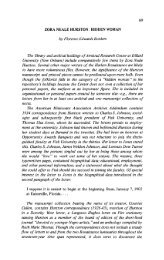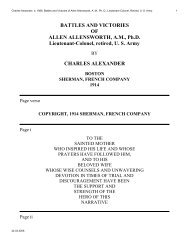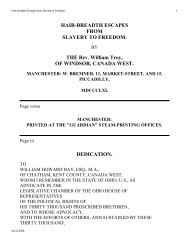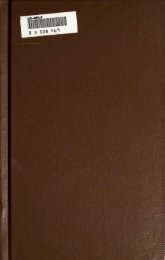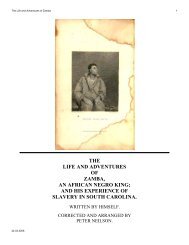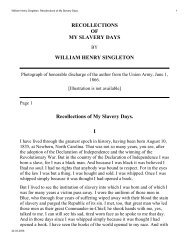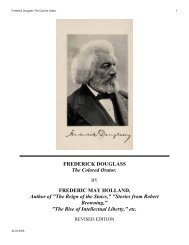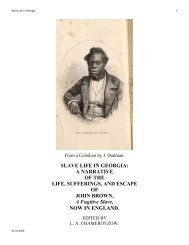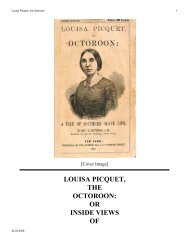Booker T. Washington, Builder o - African American History
Booker T. Washington, Builder o - African American History
Booker T. Washington, Builder o - African American History
You also want an ePaper? Increase the reach of your titles
YUMPU automatically turns print PDFs into web optimized ePapers that Google loves.
<strong>Booker</strong> T. <strong>Washington</strong>, <strong>Builder</strong> of a Civilization. 110<br />
Uncle Harry finally decided that he must have a real house. Accordingly he<br />
came to his employer, told him his feeling in the matter, and laid before him his<br />
meagre savings, which he had determined to spend for a real house. Mr.<br />
<strong>Washington</strong> went with him to select the lot and added enough out of his own<br />
pocket to the scant savings to enable the old man to buy a cow and a pig and a<br />
garden plot as well as the house. From then on for weeks he and old Uncle<br />
Harry would have long and mysterious conferences over the planning of that<br />
little four-room cottage. It is doubtful if Dr. <strong>Washington</strong> ever devoted more time<br />
or thought to planning any of the great buildings of the Institute. No potentate<br />
was ever half as<br />
Page 146<br />
proud of his palace as Uncle Harry of his four-room cottage when it was finally<br />
finished and painted and stood forth in all its glory to be admired of all men.<br />
And <strong>Booker</strong> <strong>Washington</strong> was scarcely less proud of it than Uncle Harry.<br />
With Uncle Harry Varner, Old Man Brannum, the original cook of the school to<br />
whom reference has already been made, and Lewis Adams of the town of<br />
Tuskegee, whom Mr. <strong>Washington</strong> mentions in "Up from Slavery" as one of his<br />
chief advisers, all unlettered-before-the-war Negroes, his relationship was<br />
always particularly intimate. These three old men enjoyed the confidence of the<br />
white people of the town of Tuskegee to an unusual extent and often acted as<br />
ambassadors of good-will between the head of the school and his white<br />
neighbors when from time to time the latter showed a disposition to look<br />
askance at the rapidly growing institution on the hill beyond the town.<br />
Another intimate friend of Mr. <strong>Washington</strong>'s was Charles L. Diggs, known<br />
affectionately on the school grounds as "Old Man Diggs." The old man had<br />
been body servant to a Union officer in the Civil War and after the war had been<br />
carried to Boston, where he became the butler in a fashionable Back Bay family.<br />
When Mr. <strong>Washington</strong> first visited Boston, as an humble and obscure young<br />
Negro school teacher pleading for his struggling school, he met Diggs, and<br />
Diggs succeeded in interesting his employers in the sincere and earnest young<br />
Negro teacher. When years afterward the Institute had grown<br />
Page 147<br />
to the dignity of needing stewards, Mr. <strong>Washington</strong> employed his old friend as<br />
steward of the Teachers' Home. In all the years thereafter hardly a day passed<br />
24.03.2006


